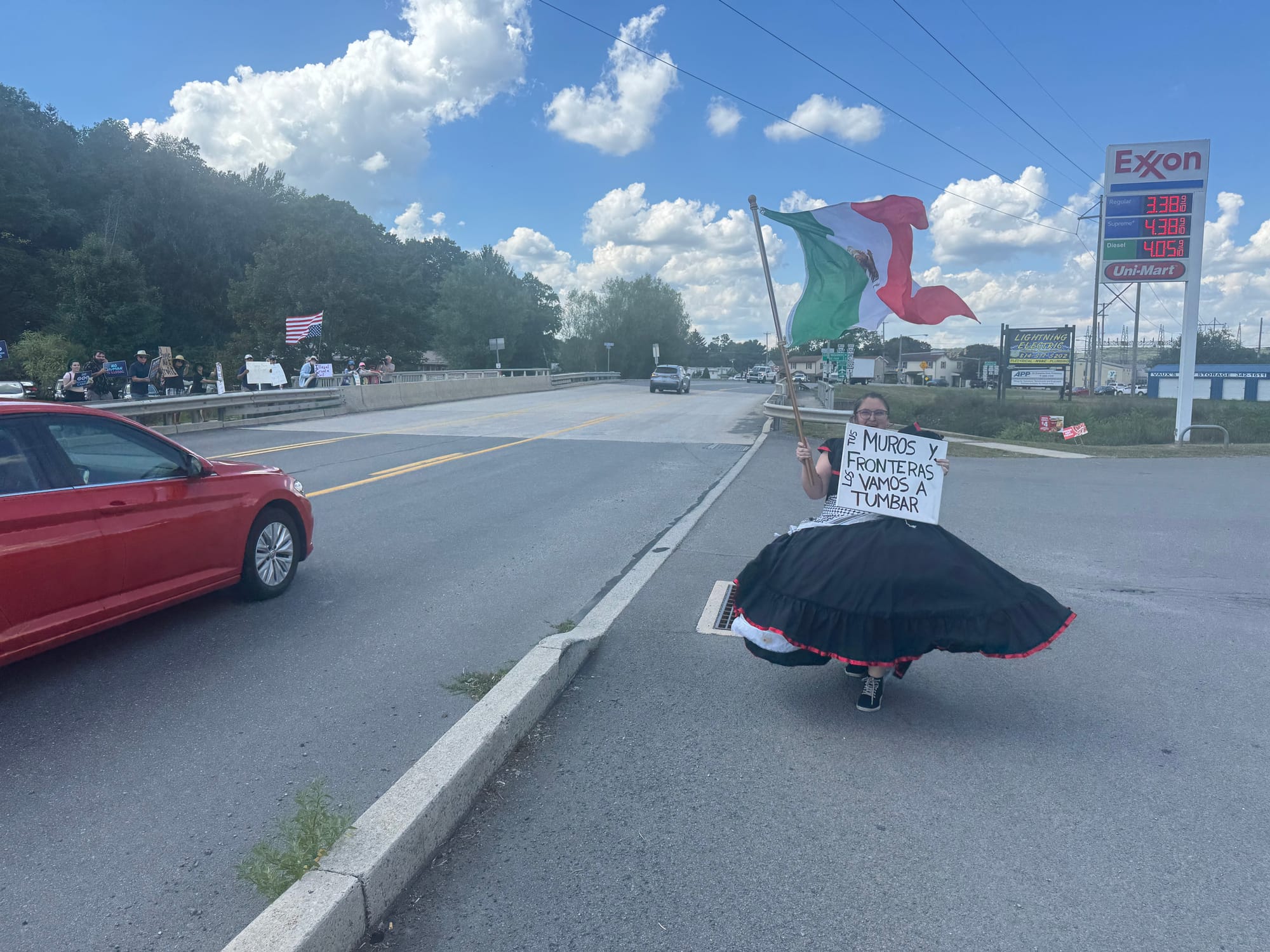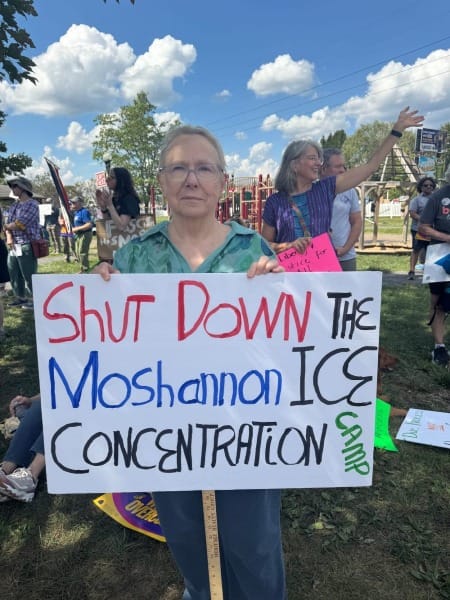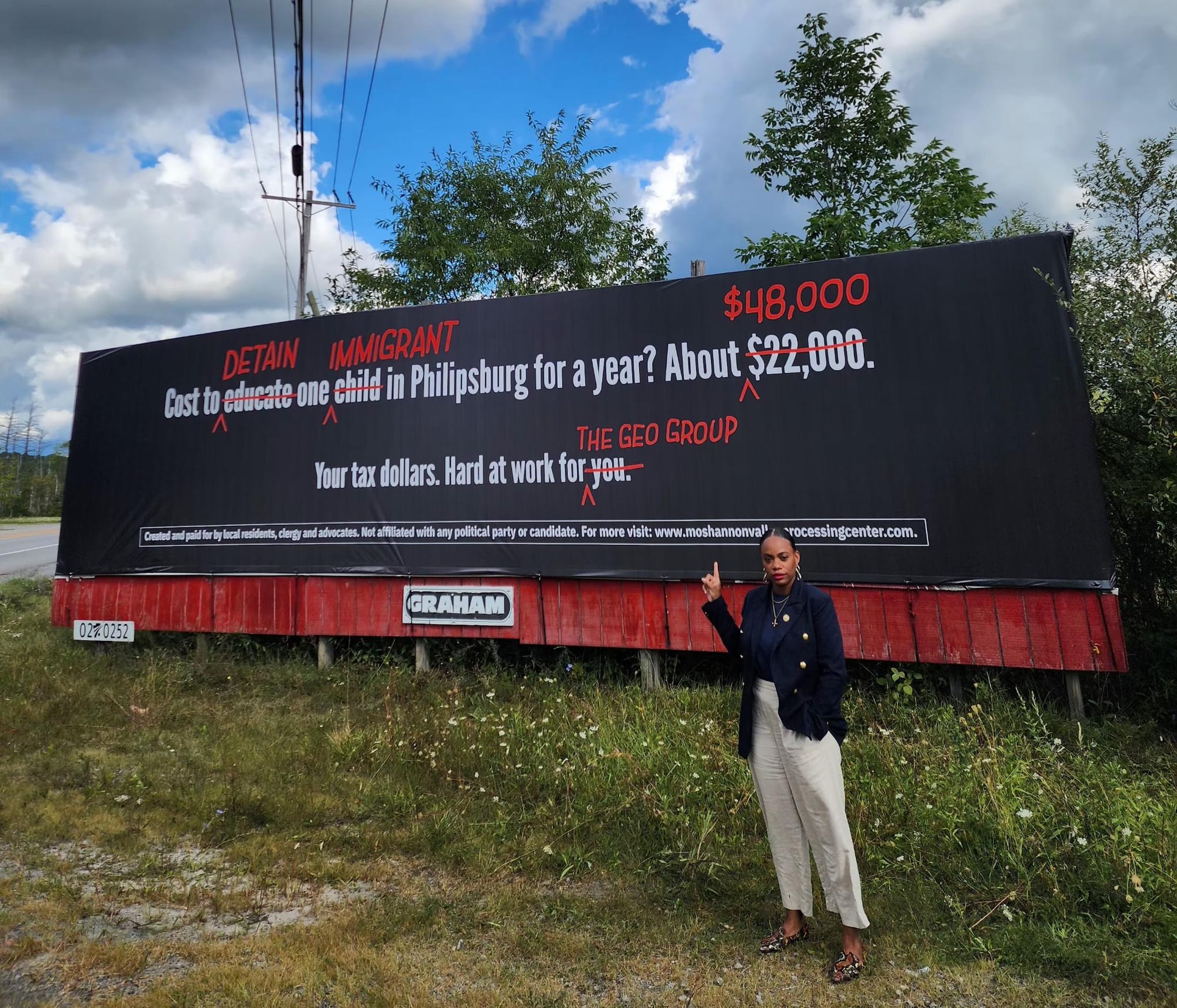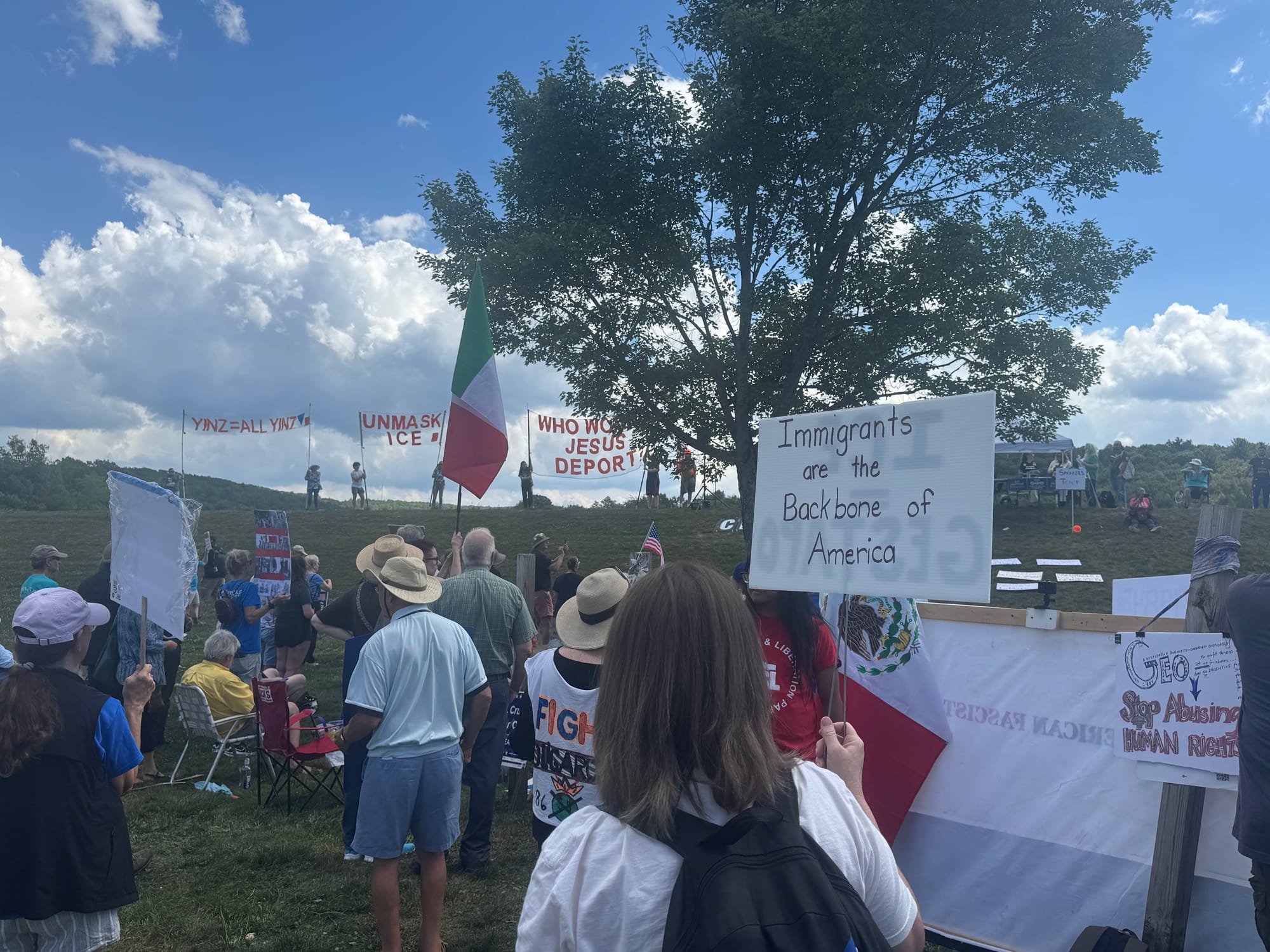PHILLIPSBURG, PA. - Early on Sunday morning, members of the Pittsburgh chapter of the Party for Socialism and Liberation (PSL) gathered in the parking lot in East Liberty to go to Phillipsburg, PA, an old coal mining town in Central PA. The coal mines have closed, and the town's largest employer is ICE's Moshannon Valley Processing Center, operated by the private prison contractor GEO Group.
The Moshannon Valley Processing Center is the largest ICE facility in the northeastern United States and is considered one of the most inhumane.
On average, 147 immigrants per month have been locked in solitary confinement, nearly twice the national average for an ICE facility. The conditions are so brutal inside the prison that one detainee, Chaofeng Ge, killed himself in 2025. The suicide has helped bring attention to the facility's problems
Members of the group are excited, but some are nervous to protest in a small town like Phillipsburg, deep in Trump country.
"A lot of people are scared and don't know what to do, but we can point them in the right direction," says June Wearden as the bus attempts to leave the parking lot in Pittsburgh. But then the bus gets stuck, and the driver is unable to navigate the turns to leave the parking lot.
Members of the PSL hop out of the bus to help it navigate around. At one point, the bus driver exclaims, "I don't think I can get it out of this parking lot."
Eventually, the PSL members help the bus driver to navigate, driving the charter bus over a median and, after 20 minutes of trying, escaping the parking lot to get on the road to the Moshannon Valley.
"I was nervous that we wouldn't even get out of the parking lot," says Wearden.
After a three-hour drive through the Appalachian mountains, the bus arrives at a lakeside park in Moshannon Valley. There are hundreds of protestors, who traveled from all over the state, some even waving Mexican flags as some truckers drive by honking their horns in solidarity. In contrast, Trump supporters drive by yelling at the protestors.

"I wanted to show that I was proud to be Mexican," says Angelica Medina, carrying a Mexican flag and dressed in a large traditional Chiapaneco dress. "I wanted to show that I'm not afraid to be Mexican in a place like this."
The rally is held at the Cold Stream Dam and Memorial Park, a picturesque lakeside setting in the mountains. Local residents fish from the lakeshore, looking on with amusement at the rally.
Phillipsburg's Republican Mayor even showed up with a cigar in hand to take in the spectacle.
"I don't agree with the protestors," says Streno between puffs on his cigar. "But I support their right to protest."
Not everyone is as nice or friendly as Streno.
"Fuck you, fuck you," yells one person as they drive by. As protestors attempt to cross the highway into the park, one driver attempts to barrel through the crowd, but is stopped as protestors fail to yield.
"This is a Trump town though and I'm putting my neck out to say it, because I could be firebombed tonight," says Phillipsburg town councilman Luther Gette, who helped to organize the protest. "I already had a rock thrown through my window, but I'm taking that risk because I think it is definitely time for people to speak up."
Luther Gette is 87 years old and the only Democrat of the seven members of the town council of Phillipsburg. He says that he's never seen a protest this big before in Phillipsburg.
"I never imagined that I would see a protest this big in Phillipsburg," says Gette.
Before the protest, there had been little discussion of the ICE facility located in their community. But now with activists from all over the state descending on Phillipsburg, there has been much debate over the facility, with the local newspaper doing stories on allegations of abuse at the prison. Clearfield County Commissioner John Sobel has even had to take to the press to defend his decision to keep the facility open.
"Opinions are divided, and the main sticking point is the fact that there are jobs," says Gette. "Old coal mining towns basically have no income," says Gette. "A prison is a good source of jobs at any point. And I wouldn't want to say that the people who work in these prisons are necessarily criminals, but there are better ways to make a living."
But with debate raging over the ICE facility in Phillipsburg, Gette says that some former guards have come forward to denounce conditions in the facility.
"We've had a quick education on this in the last couple of weeks. I knew for a long time that that prison was out there, that detention facility, but I wasn't aware of the alleged abuses," says Gette.

Many townspeople object to out-of-town people coming to Phillipsburg to protest the facility. However, activists say that their communities are intricately linked to Phillipsburg, as immigrants from their communities are being sent there.
Jamie Martinez is a community defense organizer with the Pittsburgh-based immigrants' rights group Casa San Jose. He says that many immigrants detained in Pittsburgh, over three hours away, get sent to Moshannon Valley. A few weeks ago, Martinez visited a detainee in the facility and, even as an experienced immigrant rights organizer, found himself horrified. He says that he visited a friend who was detained for nine days without any prison official speaking to him.
"He would bang on the door for hours to be able to speak on the phone for somebody," says Martinez. "And time and time again, like nobody explained anything in a language he could understand. And there was no clear process where he would be met without answers. He spent weeks like that."
Equally troubling, the man was only given one change of underwear.
"When I arrive at this visitation area and see him come out, he's wearing a red jumpsuit," says Martinez. "And he begins to tell me that that's the only jumpsuit that he had, that he couldn't wash his clothes, wash his underwear, in his cell in solitary confinement, where he had been for nine days, and he pulled his collar forward like this, and he showed me the yellow sweat stains."
ICE often pressures people to sign self-deportation papers by treating them poorly while in detention. Martinez says that immigrants in detention are aware of the protests that give them hope. Each night, the immigrants not in solitary confinement gather in their pods to praise and try to encourage one another to keep their spirits up.
"The inmates in there, they give me hope," says Martinez. "They tell me that every night, they gather their chairs in a large circle in one of the pods, and they pray together for hours, and they build community among each other. And that's the way in which we're able to realize, even through the darkest of times, we can do something good. We can find that hope, that light."
Chris Rabb, a Black State Representative in Philadelphia, who is running for US Congress, says the movement against the Moshannon Valley ICE detention inspired him to travel nearly four hours to speak at the protest. He says that it's crucial to bridge the urban-rural divide in connecting movements in Pennsylvania.
"If you're so arrogant to think that all the best ideas and all the best people come from places that you live in and look like, you've already lost," says Rabb. "It takes us out of our physical comfort zone, also our cultural comfort zones. I don't feel comfortable coming to these parts of Pennsylvania as a Black man alone, but this is what we need to do to build the movement."
Interestingly, Rabb tells the crowd that some Democrats in his own party don't feel comfortable with backing protests like these.
"There's a lot of Democrats who wish I wasn't here. I make it difficult for them to remain silent," Rabb tells the crowd. "But I'm not going to be silent, particularly when I look across this amazing group of humanity and you inspire me, I know that as a public servant, there's a responsibility for me to inspire you, but in this moment, you inspire me to do the work that all elected officials should do."
The energy of the protests is helping mobilize some Democrats to speak out. When she found out about the rally in Phillipsburg, US Congresswoman Summer Lee of Pittsburgh decided to coordinate a surprise visit to the facility on Monday to keep attention focused on the facility.

However, Lee was denied the right to enter the facility despite being the ranking Democrat on the US House Oversight subcommittee on federal law enforcement, including ICE. Lee says that not allowing her to enter the facility is a violation of the Constitution since she has direct oversight over it.
"Last year, Congress passed a law that explicitly prohibits DHS from preventing members of Congress from entering any facilities operated by them. The law also clarifies that members of Congress are not required to provide prior notice before entering any such facilities for oversight purposes," said Lee in an interview with Payday Report. "Denying us entry is another example of (the) Trump administration's executive overreach."
Congresswoman Lee says that the protest movement against Moshannon is helping to put pressure on ICE.
"Of course, (these protests) have an effect, because they've reached the attention of members of Congress, they've garnered the attention of the press who are now shining a light on this facility and others like it," said Lee.
As abuses of immigrants get more attention, polling shows that Americans have solidly turned against Trump's immigration policies. According to a Gallup poll, disapproval of Trump's immigration approach outweighs approval by a record 27 points.
Lee says that her Congressional office has been contacted by local townspeople who worked in the ICE detention facility, who are upset about conditions.
"We have also heard reports of a number of people leaving that facility, of quitting. There is information that trickles out from the facility itself," says Lee. She says that right now, the key is to keep attention focused on the Moshannon Valley ICE detention center.
Activists plan to continue protesting the facility and have erected billboards around Phillipsburg to draw attention to the abuses within the facility. These billboards also provide information on ways local people can get involved in organizing efforts against the facility.
"So I hope, and especially in light of our inability to get in, that there is still pressure that's coming in from the press," says Lee. "We expect that pressure to come from folks in the town, from folks who are impacted or who are doing advocacy."

